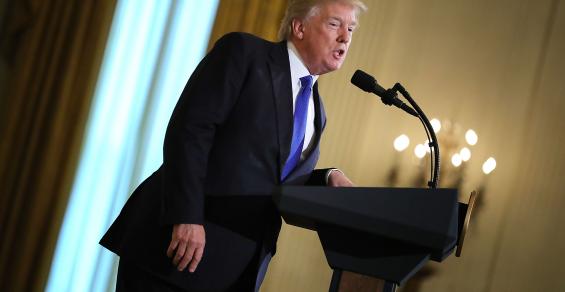Nowhere has President Trump proved more elusive than with his positions on trade—driving both his supporters here and trade partners on the other side of the negotiating table crazy.
Just earlier this week, for example, he told governors and mayors about announcing a “reciprocal tax” within days on certain items, aimed at countries he thinks are taking advantage of America. His top aides were caught blinking, as no one had prepared any formal plans.
He also has plans for imported steel and aluminum tariffs under consideration but no one seems to know his intentions, due to be announced in April.
After busting Mexico’s chops constantly during the campaign and since the election, Trump had USTR [Office1] Lighthizer float a trial balloon last week about wrapping up talks with Mexico first, if the U.S. and Canada kept clashing, according to Politico’s Morning Agriculture. The Democrats immediately cried foul, as they want “major labor and wage improvements” from Mexico if they are expected to support any new agreement.
Meanwhile, after seven rounds of negotiations, Steve Verheul, Canada’s chief negotiator, said the U.S. has shown “little to no flexibility” in negotiations, resulting in “fairly limited progress,” even on easy issues. Verheul accused the U.S. of taking a “winner-take-all” approach that he said was being “driven to a large extent from the top.”
Kent Bacus, NCBA’s director of international trade and market access, attended the recently-completed Montreal round and said both Canadian and Mexican negotiators seemed more engaged than previously.
Detect a trend here? Me neither.
It won’t be anything like the cavalry riding to the rescue, but agriculture should soon have a major warrior on its side in the negotiations. Gregg Doud, former NCBA chief economist, having cleared confirmation committee hearings, should soon get a Senate floor vote to become America’s chief agricultural negotiator.
Doud’s status was uncertain until recently. Sen. Jerry Moran (R-KS) called Sen. Jeff Flake (R-AZ) the day before he was to address an NCBA convention committee session, asking if he could be allowed to announce the lifting of the hold Flake had put on Doud’s nomination. The hold had nothing to do with Doud or trade but it had left negotiators without Doud as the chief ag negotiator all this time. Flake agreed and Doud’s vote is supposed to be on a fast-track schedule.
With U.S. Congressional midterms this year, Bacus said May would be the latest negotiations could wrap up in 2018. After that, nothing would happen here until year end and the Mexican presidential election happens in July.
Perhaps more problematic is that President Trump’s Trade Promotion Authority (TPA) or fast track negotiating authority expires in July. The Democrats tend to dislike trade anyway, given that their labor union and environmental activist supporters oppose trade.
However, it could be that the auto unions might have a little broader view of things these days, after the education of everyone as to how the auto supply and assembly chain is intertwined between all three countries. Even some Republicans are not sure about trade, not understanding how everyone benefits from all countries doing what they do best, with the labor and natural resources available, and trading for other needs at the best price. We’ve heard very little speculation as to how big a fight renewing TPA could be—Bush couldn’t get it for years—but right now the Democrats would deny Trump hair spray if they could.
Congressional leadership had a chance recently during White House meetings to repeat again to the White House how important trade is to the economies of their states, from ports and manufacturing to agriculture and support jobs.
One of Washington’s most experienced trade lawyers gave an NCBA committee his best estimation of NAFTA’s near term. If the President signs a notice of withdrawal from NAFTA, that sets off a six-month notice period, Gary N. Holick said. That would ruin farm and ranch income, commodity futures would collapse, manufacturers with 60-day layoff notice requirements would begin sending out notices and legal suits would be filed. Mexico and Canada would start hunting new suppliers.
Will Trump invoke such a scenario? Horlick thinks not. He thinks that negotiations will drag into next year, while everyone takes advantage of NAFTA provisions in the meantime.
Dittmer is a longtime beef industry commentator and executive
[Office1]Let’s write out




Leave A Comment